(完整版)小学五年级英语下册知识点归纳总结
- 格式:doc
- 大小:66.01 KB
- 文档页数:9
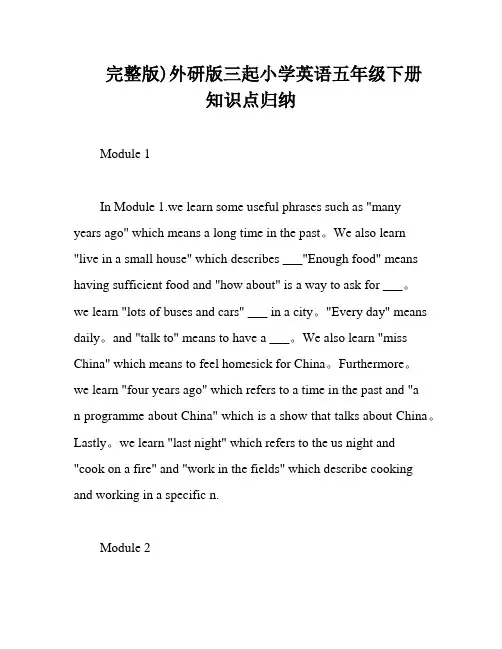
完整版)外研版三起小学英语五年级下册知识点归纳Module 1In Module 1.we learn some useful phrases such as "many years ago" which means a long time in the past。
We also learn "live in a small house" which describes ___"Enough food" means having sufficient food and "how about" is a way to ask for ___。
we learn "lots of buses and cars" ___ in a city。
"Every day" means daily。
and "talk to" means to have a ___。
We also learn "miss China" which means to feel homesick for China。
Furthermore。
we learn "four years ago" which refers to a time in the past and "an programme about China" which is a show that talks about China。
Lastly。
we learn "last night" which refers to the us night and "cook on a fire" and "work in the fields" which describe cooking and working in a specific n.Module 2In Module 2.we learn some more ___ in China。
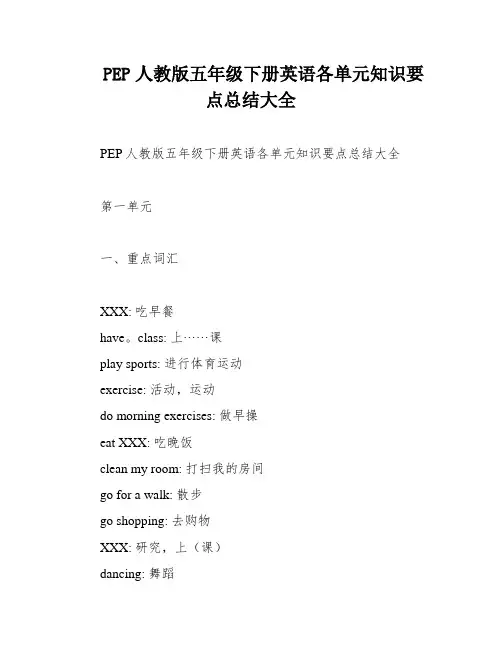
PEP人教版五年级下册英语各单元知识要点总结大全PEP人教版五年级下册英语各单元知识要点总结大全第一单元一、重点词汇XXX: 吃早餐have。
class: 上······课play sports: 进行体育运动exercise: 活动,运动do morning exercises: 做早操eat XXX: 吃晚饭clean my room: 打扫我的房间go for a walk: 散步go shopping: 去购物XXX: 研究,上(课)dancing: 舞蹈take a dancing class: 上舞蹈课a.m.: 上午p.m.: 下午usually: 通常地二、其他日常活动get up: 起床eat XXX: 吃午饭go to bed: 上床睡觉XXX: 洗脸XXX: 洗我的衣服watch TV: 看电视play ping-pong: 打乒乓球play the pipa: 弹琵琶go swimming: 去游泳go running: 去跑步do homework: 做作业do kungfu: 练武术play football: 踢足球play basketball: 打篮球三、语音cl→[cl]: clean。
please。
play。
clock。
class。
cleverpl→[pl]: plate。
eggplant注意:cl和pl放在词尾与e结合变为cle和ple时发音不同。
四、频度副词always: 总是,一直(100%)usually: 通常(80%)often: 经常(60%)sometimes: 有时(30%)五、疑问词why: 为什么when: 什么时候六、重点句型1、询问别人什么时候做某事的句型及回答。
句型结构:问:When do you+动词短语原形+其他?(你/你们什么时候做某事?)答:I/we(+频度副词)+动词短语原形+at+具体时间.(我/我们通常在几点做某事。
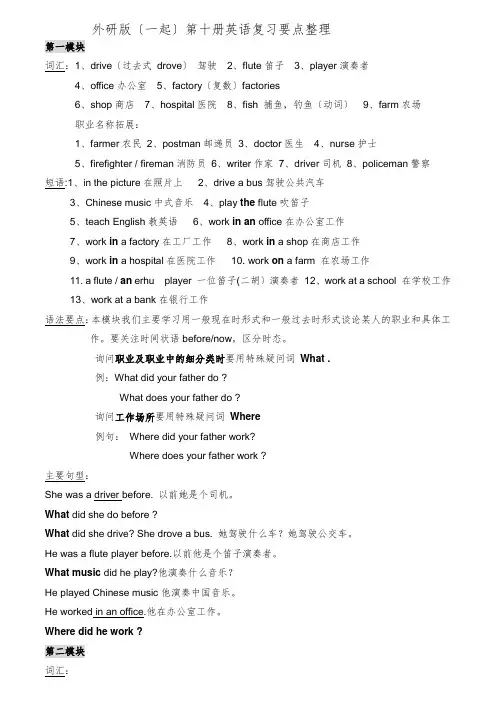
外研版〔一起〕第十册英语复习要点整理第一模块词汇:1、drive〔过去式drove〕驾驶2、flute笛子3、player演奏者4、office办公室5、factory〔复数〕factories6、shop商店7、hospital医院8、fish 捕鱼,钓鱼〔动词〕9、farm农场职业名称拓展:1、farmer农民2、postman邮递员3、doctor医生4、nurse护士5、firefighter / fireman消防员6、writer作家7、driver司机8、policeman警察短语:1、in the picture在照片上2、drive a bus驾驶公共汽车3、Chinese music中式音乐4、play the flute吹笛子5、teach English教英语6、work in an office在办公室工作7、work in a factory在工厂工作8、work in a shop在商店工作9、work in a hospital在医院工作10. work on a farm 在农场工作11. a flute / an erhu player 一位笛子(二胡〕演奏者12、work at a school 在学校工作13、work at a bank在银行工作语法要点:本模块我们主要学习用一般现在时形式和一般过去时形式谈论某人的职业和具体工作。
要关注时间状语before/now,区分时态。
询问职业及职业中的细分类时要用特殊疑问词What .例:What did your father do ?What does your father do ?询问工作场所要用特殊疑问词Where例句:Where did your father work?Where does your father work ?主要句型:She was a driver before. 以前她是个司机。
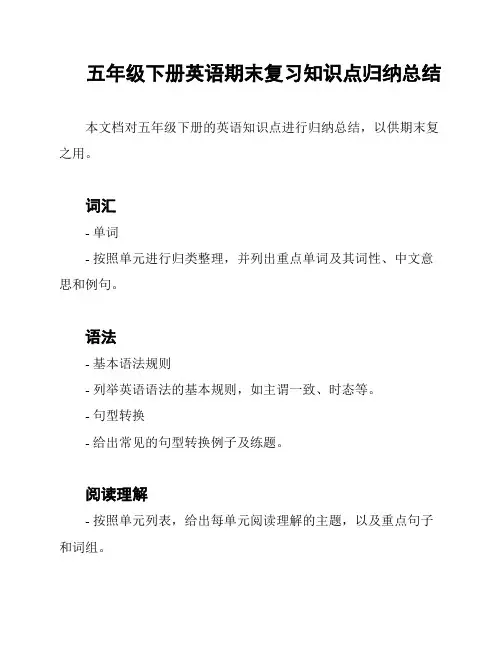
五年级下册英语期末复习知识点归纳总结
本文档对五年级下册的英语知识点进行归纳总结,以供期末复之用。
词汇
- 单词
- 按照单元进行归类整理,并列出重点单词及其词性、中文意思和例句。
语法
- 基本语法规则
- 列举英语语法的基本规则,如主谓一致、时态等。
- 句型转换
- 给出常见的句型转换例子及练题。
阅读理解
- 按照单元列表,给出每单元阅读理解的主题,以及重点句子和词组。
听力练
- 按照单元进行分类,提供一些听力练题目,帮助学生提高听力技能。
写作练
- 提供一些写作练题目,包括作文和填空题,帮助学生提升英语写作能力。
口语练
- 提供一些口语练题目,包括对话和情景交际,帮助学生锻炼口语表达能力。
课文重点
- 按照单元列出每课重点句子和生词,供学生复重点。
常见错误
- 总结学生常见的错误,给出相应的纠正方法和例句。
其他
- 可以根据实际情况,加入其他有助于复的内容,如英语研究资源推荐等。
以上内容是五年级下册英语期末复知识点的归纳总结,希望对同学们的复有所帮助。
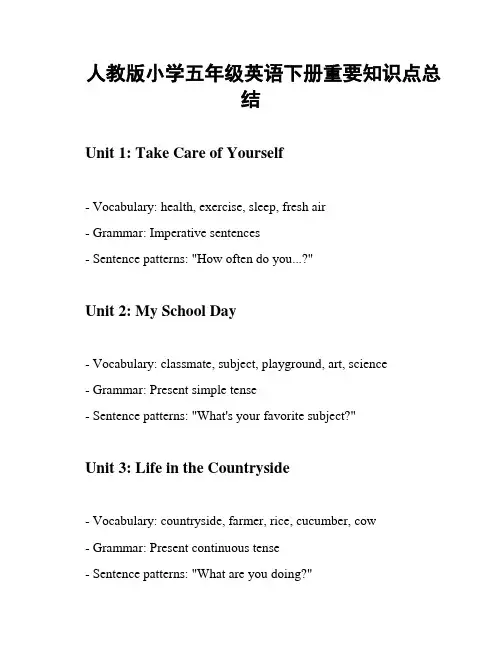
人教版小学五年级英语下册重要知识点总结Unit 1: Take Care of Yourself- Vocabulary: health, exercise, sleep, fresh air- Grammar: Imperative sentences- Sentence patterns: "How often do you...?"Unit 2: My School Day- Vocabulary: classmate, subject, playground, art, science- Grammar: Present simple tense- Sentence patterns: "What's your favorite subject?"Unit 3: Life in the Countryside- Vocabulary: countryside, farmer, rice, cucumber, cow- Grammar: Present continuous tense- Sentence patterns: "What are you doing?"Unit 4: Traditional Festivals- Vocabulary: festival, tradition, Spring Festival, Lantern Festival, Dragon Boat Festival- Grammar: Past simple tense- Sentence patterns: "What did you do during the festival?"Unit 5: Shopping in the Supermarket- Vocabulary: supermarket, shopping cart, cashier, customer, price - Sentence patterns: "Which one do you like better?"Unit 6: A Busy Day- Vocabulary: busy, appointment, schedule, overtime, exhausted- Grammar: Future tense- Sentence patterns: "What will you do tomorrow?"Unit 7: Animal World- Vocabulary: habitat, species, predator, prey, extinct- Grammar: Singular and plural nouns- Sentence patterns: "How many... are there?"Unit 8: My Hobbies- Vocabulary: hobby, interest, collect, play the piano, read books - Grammar: Present continuous tense- Sentence patterns: "What are you interested in?"Unit 9: Travel Around China- Vocabulary: scenery, landmark, Great Wall, Forbidden City, panda- Grammar: Adverbs of frequency- Sentence patterns: "How often do you go...?"Unit 10: Our World- Vocabulary: pollution, recycle, environment, waste, conserve- Grammar: Modal verbs (can, should, must)- Sentence patterns: "What can we do to save the Earth?"以上是人教版小学五年级英语下册的重要知识点总结。
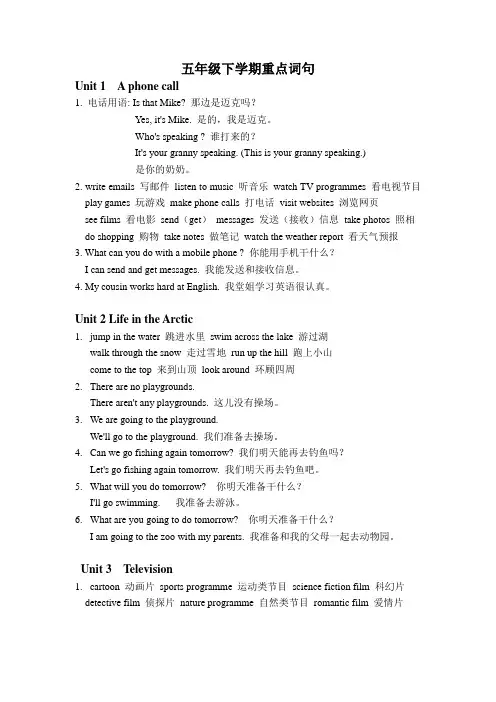
五年级下学期重点词句Unit 1 A phone call1. 电话用语: Is that Mike? 那边是迈克吗?Yes, it's Mike. 是的,我是迈克。
Who's speaking ? 谁打来的?It's your granny speaking. (This is your granny speaking.)是你的奶奶。
2. write emails 写邮件listen to music 听音乐watch TV programmes 看电视节目play games 玩游戏make phone calls 打电话visit websites 浏览网页see films 看电影send(get)messages 发送(接收)信息take photos 照相do shopping 购物take notes 做笔记watch the weather report 看天气预报3. What can you do with a mobile phone ? 你能用手机干什么?I can send and get messages. 我能发送和接收信息。
4. My cousin works hard at English. 我堂姐学习英语很认真。
Unit 2 Life in the Arctic1.jump in the water 跳进水里swim across the lake 游过湖walk through the snow 走过雪地run up the hill 跑上小山come to the top 来到山顶look around 环顾四周2.There are no playgrounds.There aren't any playgrounds. 这儿没有操场。
3.We are going to the playground.We'll go to the playground. 我们准备去操场。
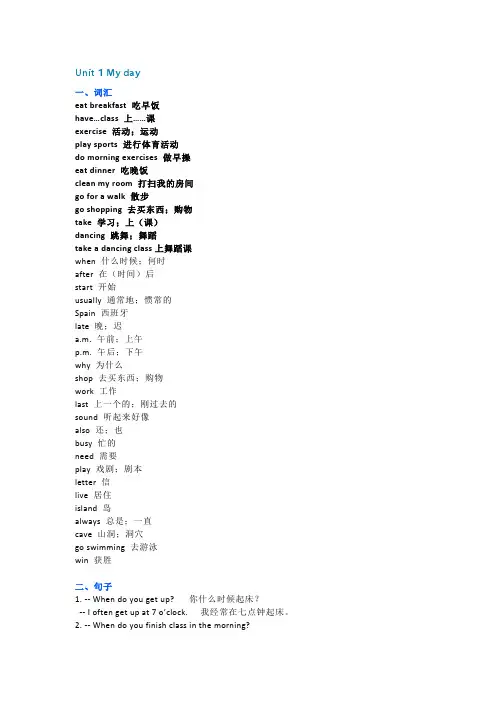
Unit 1 My day一、词汇eat breakfast 吃早饭have…class 上……课exercise 活动;运动play sports 进行体育活动do morning exercises 做早操eat dinner 吃晚饭clean my room 打扫我的房间go for a walk 散步go shopping 去买东西;购物take 学习;上(课)dancing 跳舞;舞蹈take a dancing class 上舞蹈课when 什么时候;何时after 在(时间)后start 开始usually 通常地;惯常的Spain 西班牙late 晚;迟a.m. 午前;上午p.m. 午后;下午why 为什么shop 去买东西;购物work 工作last 上一个的;刚过去的sound 听起来好像also 还;也busy 忙的need 需要play 戏剧;剧本letter 信live 居住island 岛always 总是;一直cave 山洞;洞穴go swimming 去游泳win 获胜二、句子1. -- When do you get up? 你什么时候起床?-- I often get up at 7 o’clock. 我经常在七点钟起床。
2. -- When do you finish class in the morning?你们上午的课什么时候结束?-- We finish class at 1 o’clock. 我们一点钟课程结束。
3. Classes start at 3 o’clock. 三点钟开始上课。
4. -- When do you usually eat dinner in Spain?你在西班牙通常什么时候吃晚饭?-- Usually at 9:30 or 10 o’clock. 通常在九点三十分或十点钟。
5. That’s too late! 那太晚了!6. -- When do you do morning exercises? 你什么时候做早操?-- At 7 o’clock. 在七点钟。
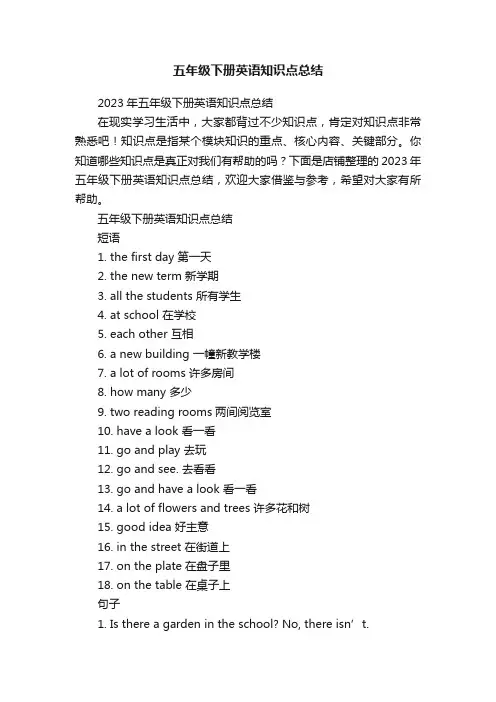
五年级下册英语知识点总结2023年五年级下册英语知识点总结在现实学习生活中,大家都背过不少知识点,肯定对知识点非常熟悉吧!知识点是指某个模块知识的重点、核心内容、关键部分。
你知道哪些知识点是真正对我们有帮助的吗?下面是店铺整理的2023年五年级下册英语知识点总结,欢迎大家借鉴与参考,希望对大家有所帮助。
五年级下册英语知识点总结短语1. the first day 第一天2. the new term 新学期3. all the students 所有学生4. at school 在学校5. each other 互相6. a new building 一幢新教学楼7. a lot of rooms 许多房间8. how many 多少9. two reading rooms两间阅览室10. have a look 看一看11. go and play 去玩12. go and see. 去看看13. go and have a look 看一看14. a lot of flowers and trees 许多花和树15. good idea 好主意16. in the street 在街道上17. on the plate 在盘子里18. on the table 在桌子上句子1. Is there a garden in the school? No, there isn’t.学校里有个花园吗?不,没有。
2. Is there a reading room near the playground? Yes, there is.操场附近有个阅览室吗?是的。
3. Are there any bookcases near the window? No, there aren’t.窗子附近有一些书橱吗?不,没有。
4.Are there any pictures on the desk? Yes, there are. 课桌上有一些图片吗?是的。
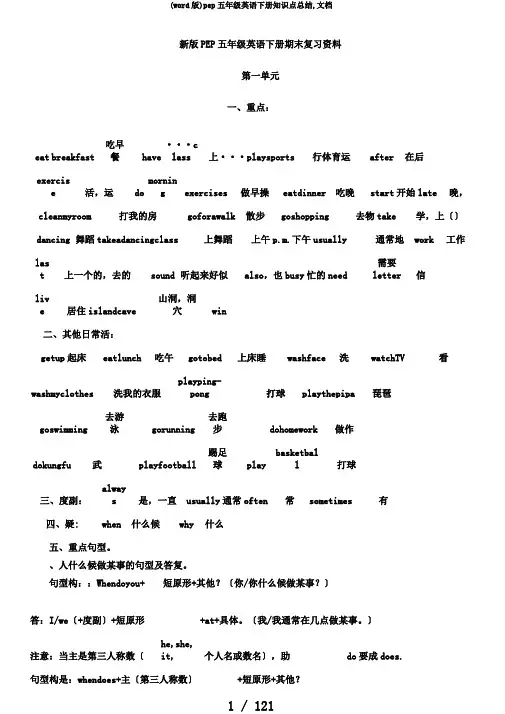
新版PEP五年级英语下册期末复习资料第一单元一、重点:eat breakfast 吃早餐have···class上···playsports行体育运after在后exercise活,运do morning exercises做早操eatdinner吃晚start开始late晚,cleanmyroom打我的房goforawalk散步goshopping去物take学,上〔〕dancing舞蹈takeadancingclass上舞蹈上午p.m.下午usually通常地work工作last上一个的,去的sound听起来好似also,也busy忙的need需要letter信live居住islandcave 山洞,洞穴win二、其他日常活:getup起床eatlunch吃午gotobed上床睡washface洗watchTV看washmyclothes洗我的衣服playping-pong打球playthepipa琵琶goswimming 去游泳gorunning去跑步dohomework做作dokungfu武playfootball 踢足球playbasketball打球三、度副:always是,一直usually通常often常sometimes有四、疑:when什么候why什么五、重点句型。
、人什么候做某事的句型及答复。
句型构::Whendoyou+ 短原形+其他?〔你/你什么候做某事?〕答:I/we〔+度副〕+短原形+at+具体。
〔我/我通常在几点做某事。
〕注意:当主是第三人称数〔he,she,it,个人名或数名〕,助do要成does.句型构是:whendoes+主〔第三人称数〕+短原形+其他?答:主〔+度副〕+短三形式+at+具体。
2、人周末做什么的句型及答复。
句型构::Whatdoyoudoontheweekend?〔你周末做什么?〕答:I〔+度副〕+〔短〕+其他。
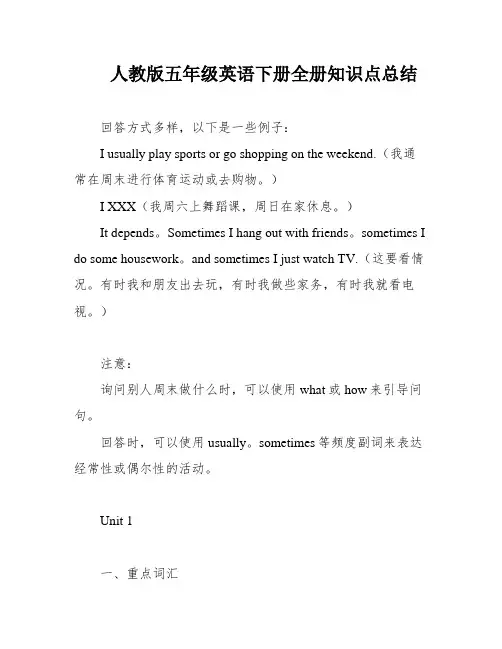
人教版五年级英语下册全册知识点总结回答方式多样,以下是一些例子:I usually play sports or go shopping on the weekend.(我通常在周末进行体育运动或去购物。
)I XXX(我周六上舞蹈课,周日在家休息。
)It depends。
Sometimes I hang out with friends。
sometimes I do some housework。
and sometimes I just watch TV.(这要看情况。
有时我和朋友出去玩,有时我做些家务,有时我就看电视。
)注意:询问别人周末做什么时,可以使用what或how来引导问句。
回答时,可以使用usually。
sometimes等频度副词来表达经常性或偶尔性的活动。
Unit 1一、重点词汇吃早餐:eat breakfast 上······课:have。
class进行体育运动:play sports做早操:do morning exercises 打扫我的房间:clean my room 去购物:go shopping舞蹈:dancing上午:a.m.通常地:usually二、其他日常活动起床:get up上床睡觉:go to bed活动,运动:exercise吃晚饭:eat XXX散步:go for a walk研究,上(课):XXX上舞蹈课:take a dancing class下午:p.m.吃午饭:eat XXX洗脸:XXX洗我的衣服:XXX看电视:watch TV打乒乓球:play ping-pong弹琵琶:play the pipa去游泳:go swimming去跑步:go running做作业:do homework练武术:do XXX踢足球:play football打篮球:play basketball三、语音cl→ [cl]:clean。
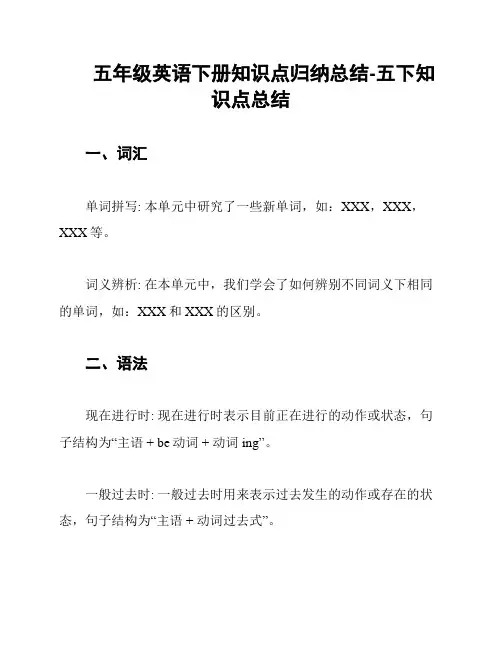
五年级英语下册知识点归纳总结-五下知识点总结一、词汇单词拼写: 本单元中研究了一些新单词,如:XXX,XXX,XXX等。
词义辨析: 在本单元中,我们学会了如何辨别不同词义下相同的单词,如:XXX和XXX的区别。
二、语法现在进行时: 现在进行时表示目前正在进行的动作或状态,句子结构为“主语 + be动词 + 动词ing”。
一般过去时: 一般过去时用来表示过去发生的动作或存在的状态,句子结构为“主语 + 动词过去式”。
宾语从句: 宾语从句是用来充当动词宾语的句子,一般由连词that或whether引导,如:I know that。
三、对话与情景询问时间: 在日常对话中,我们学会了如何询问时间及回答时间,如:What time is it。
It's。
描述天气: 我们学会了如何用简单的句子描述不同的天气状况,如:It'___。
四、阅读与写作阅读理解: 在本单元的阅读材料中,我们学会了如何通过阅读理解短文的内容,回答问题。
书信写作: 我们学会了如何写一封简单而正式的书信,包括称呼、致谢和结尾等要素。
以上是五年级英语下册的知识点归纳总结,希望对同学们的英语研究有所帮助。
五、练题1.请用现在进行时完成下列句子:(10分)I'm ____________ (read) a book now.They ____________ (play) ___.She ____________ (draw) a picture at the moment.2.请用一般过去时完成下列句子:(10分)He ________ (visit) his grandma last weekend.We ________ (watch) a ___.She ________ (clean) her room an hour ago.3.请阅读下面的短文,回答问题:(10分)___ ___ to the park with them。
新沪教牛津版五年级下册小学英语全册单元知识点小结新沪教牛津版五年级下册小学英语期末复习(全册单元知识点小结)Module Changes and differences一、核心词汇1.名词性物主代词yours你的;你们的mine我的hers她的theirs他们的;她们的;它们的2.名词sock短袜cap帽子crayon彩色蜡笔(或粉笔、铅笔)umbrella伞place地方future将来;未来machine机器exercise运动;锻炼;活动3.动词let让stand站;站住will将;将会4.副词why为什么then然后early早;提早hard努力地5.兼类词(双重词性)tidy整理;整洁的change改变;变化study书房;学习6.其他because因为every每;每个7.短语dining room餐室;餐厅二、拓展词汇1.名词nail钉子second秒(时间单位)mess脏乱;不整洁2.动词drop使落下;掉落stick粘贴;粘住3.形容词enough足够的more更多的4.副词twice两次easily容易地5.兼类词(双重词性)north北方;向北south南方;向南6.短语tidy up把……整理好(be) full of装满……;充满…… a few几个;一些wild goose大雁(复数wild geese) in the future将来in front of 在……前面take a photo拍照wear glasses戴眼镜(be)weak in不擅长not … any more不再all day 一天到晚do exercise做运动三、核心句型1.— Are they yours?它们是你的?— No,they aren’t. 不,它们不是。
解读: 问句是一个一般疑问句,用来询问某物的归属,有肯定和否定两种回答。
举一反三: — Are these crayons yours?这些蜡笔是你的吗?— No,they aren’t. 不,它们不是。
PEP小学英语五年级下册各单元重要知识点整理Unit 1: Let's Celebrate- Vocabulary: words related to festivals and celebrations- Grammar: using the simple past tense to talk about past events- Sentence patterns: "Did you...?" and "Yes, I did. / No, I didn't."Unit 2: Shopping Time- Vocabulary: words related to shopping and clothing- Grammar: using "How much" and "How many" to ask about quantity- Sentence patterns: "How much is/are...?" and "How many...?"Unit 3: My School Life- Vocabulary: words related to school subjects and activities- Sentence patterns: "What's your favorite subject/activity?"Unit 4: Our Hobbies- Vocabulary: words related to hobbies and activities- Grammar: using "can" to talk about ability and permission- Sentence patterns: "Can you...?"Unit 5: In the Countryside- Vocabulary: words related to the countryside and nature- Grammar: using prepositions to describe locations- Sentence patterns: "Where is/are...?" and "Is there/are there...?"Unit 6: Let's Make a Difference- Vocabulary: words related to environmental issues and actions- Grammar: using imperatives to give instructions- Sentence patterns: "Turn off/on the lights." and "Recyclepaper/plastic."Unit 7: Our Neighborhood- Vocabulary: words related to places in a neighborhood- Grammar: using "there is" and "there are" to describe the presence of something- Sentence patterns: "There is/are...in my neighborhood."Unit 8: Healthy Habits- Vocabulary: words related to health and daily routines- Grammar: using the present continuous tense to talk about ongoing actions- Sentence patterns: "What are you doing...?"Unit 9: Moving Around- Vocabulary: words related to transportation and directions- Grammar: using prepositions of place to describe movement- Sentence patterns: "How do you go to...?" and "Turn left/right."Unit 10: Let's Explore- Vocabulary: words related to exploration and discovery- Grammar: using the present perfect tense to talk about past experiences- Sentence patterns: "Have you ever...?"以上是PEP小学英语五年级下册各单元的重要知识点整理。
五年级下册英语知识点总结英语是一门重要的语言,在学习中我们要掌握一些基本的知识点。
下面,我将对五年级下册的英语知识点进行总结。
一、语法知识点:1. 定冠词和不定冠词的用法:定冠词“the”用于特指某一事物,不定冠词“a/an”用于泛指或表示单数。
2. 一般过去时的构成及用法:一般过去时是表示过去的动作或状态,通常情况下,我们在动词原形后面加上了“ed”。
3. 现在进行时的构成及用法:现在进行时表示现在正在进行的动作。
4. 情态动词的用法:情态动词包括can、could、may、might、must、shall、should、will、would等。
5. 句子的基本结构:句子由主语和谓语构成,其它部分可以是宾语、定语、状语等。
二、词汇知识点:1. 动词的不规则变化形式:有些动词在过去时和过去分词形式上不规则变化。
2. 数词的用法:数词可以表示一个特定的数量或顺序。
3. 形容词和副词的比较级和最高级形式:形容词和副词可以通过在词尾加“er”和“est”来表示比较级和最高级。
4. 时态与动词的变化:动词会根据时态的不同而发生变化。
5. 名词的单数和复数形式:名词的单数和复数形式有一定的规则,比如一般在词尾加“s”。
三、阅读技巧和写作技巧:1. 阅读理解的基本技巧:在阅读理解中,要注意细节,理解文章中的主题和中心思想。
2. 词汇的拼写:拼写是英语学习中必不可少的一个环节,要勤加练习,注意单词的拼写规则。
3. 书写规范与整洁:在写作时要注意书写规范和整洁,避免出现拼写错误和书写混乱。
四、口语表达技巧:1. 问答对话的基本句型:在口语交流中,问答对话是常见的形式,要掌握一些基本的句型,以便能够参与到对话中。
2. 日常用语和常用口语表达:日常用语和常用口语表达是提高口语交流能力的关键。
3. 谈论个人喜好和兴趣:谈论个人喜好和兴趣可以让我们更好地与人交流,增进了解和友谊。
总结:五年级下册的英语学习内容相对较多,掌握这些知识点对于英语学习的进一步发展非常重要。
五年级英语下册必背知识点汇总Unit 1: My Friends- Vocabulary: Words related to family and friends, such as father, mother, sister, brother, friend, etc.- Grammar: Possessive pronouns (my, your, his, her, etc.)- Sentence patterns:- This is my friend.- Her name is Lucy.- His father is a doctor.- My sister likes to play soccer.- Dialogue: Conversations about introducing family and friends.Unit 2: My School- Vocabulary: Words related to school, such as classroom, blackboard, teacher, student, etc.- Grammar: Singular and plural nouns.- Sentence patterns:- I have a new pen.- There are many students in our school.- The blackboard is big.- Dialogue: Conversations about school life.Unit 3: My Daily Routine- Vocabulary: Words related to daily activities, such as wake up, brush teeth, eat breakfast, etc.- Grammar: Simple present tense.- Sentence patterns:- I wake up at 7 o'clock every morning.- She brushes her teeth before breakfast.- They eat lunch at 12 o'clock.- Dialogue: Conversations about daily routines.Unit 4: My Hobbies- Vocabulary: Words related to hobbies, such as swim, paint, read, etc.- Grammar: Present continuous tense.- Sentence patterns:- He is swimming in the pool.- She is painting a picture.- They are reading a book.- Dialogue: Conversations about hobbies and leisure activities.Unit 5: My Town- Vocabulary: Words related to buildings and places in a town, such as hospital, library, park, etc.- Grammar: Prepositions of place.- Sentence patterns:- The hospital is next to the school.- The library is in front of the park.- The post office is between the bank and the supermarket.- Dialogue: Conversations about different locations in a town.Unit 6: My Country- Vocabulary: Words related to countries and nationalities, such as China, Japan, American, etc.- Grammar: Be verb (am, is, are).- Sentence patterns:- I am Chinese.- He is Japanese.- They are American.- Dialogue: Conversations about different countries and nationalities.Unit 7: My Travel- Vocabulary: Words related to travel, such as plane, train, car, etc.- Grammar: Simple past tense.- Sentence patterns:- I went to Beijing last month.- She traveled to Shanghai by plane.- They visited the Great Wall.- Dialogue: Conversations about travel experiences.Unit 8: My Future- Vocabulary: Words related to future plans and aspirations, such as job, doctor, teacher, etc.- Grammar: Future tense.- Sentence patterns:- I will be a doctor in the future.- She wants to be a teacher.- They plan to travel around the world.- Dialogue: Conversations about future goals.以上是五年级英语下册的必背知识点汇总,包括词汇、语法、句型和对话等内容。
英语下册知识点总结一、重点短语1. look at 看一看2. over there 在那边3. in English 用英语4. excuse me 打扰了5. in the pond 在池塘里6. play with 和… 一起玩7. of course 当然8. swim well 游泳好9. pet shop 宠物店10. a lot of 很多11. jump through a ring 越过圆环12. ride a horse 骑马13. ride a bike 骑自行车14. climb up a ladder 爬梯子15. come here 过来16. come along 过来17. come with me 跟我来18. show… around 带…参观19. this way 这边走20. borrow … from 从…借21. borrow books 借书22. read stories 读故事23. make things 制作东西24. speak English 说英语25. draw pictures 画画26. have art classes 上美术课27. dance room 舞蹈教室28. how often 多久一次29. science lab 科学实验室30. language lab 语音室31. how many 多少32. other activities 其他活动33. do experiments 做实验34. do listening 练听力35. observe things 观察事物36. do speaking 练口语37. New Year’s Day 元旦38. meeting hall 会议大厅39. Children’s Day 儿童节40. be good at 擅长41. be interested in 对…感兴趣42. music club 音乐俱乐部43. no one 没有人44. play the violin 拉小提琴45. art club 美术俱乐部46. come into 进入47. listen to music 听音乐48. cut out 剪下49. come from 来自50. up and down 上上下下51. in groups 成组52. science corner 科学角53. group work 小组活动54. do project work 做项目制作55. art corner 美术角56. computer corner 电脑角57. play football 踢足球58. be famous for 因…闻名59. study plants and animals 研究动植物60. do exercises 做运动61. on the field 在操场上62. do printing on the paper 在纸上印刷63. how about …怎么样?64.go on field trips 田野考察65. play volleyball 打排球66. play basketball 打篮球67. play hockey 打曲棍球68. play rugby 打橄榄球69. in the forest 在森林里70. have a look at 看一看71. here you are 给你72. how much 多少(钱)73. a pair of 一双;一对74. try on 试穿75. shoe shop 鞋店76. clothes shop 服装店77. make a shopping list 做购物单78. sports shop 体育用品商店79. cake shop 蛋糕店80. pay for 付钱81. feel well 感觉好82. see a doctor 看医生83. take good care of 好好照顾84. have a bad cold 得了重感冒85. have a fever 发烧86. have a stomachache 胃疼87. have a headache 头疼88. have a toothache 牙疼89. have a cough 咳嗽90. go to a concert 听音乐会91. do maths problems 做数学题92. go to the music club 去音乐俱乐部93. have to 不得不94. stay in bed 待在床上95. get well 康复96. be worried about 担心97. don’t worry 别担心98. help … with 帮助…做某事99. in the hospital 在医院里二、重点短语讲解1. play with 和…一起玩play with sb.(某人) 和…一起玩play with sth.(某物) 玩某物e.g. Lucy and Lily are playing with their mother. Lucy and Lily are playing with their doll.2. a lot of 很多 a lot of = lots of + 可数名词复数或不可数名词e.g. 同义句转换There are a lot of apples on the table. = There are ______ ______ apples on the table. (答案:lots of)3. how often 多久一次how often 是一个特殊疑问词,就频率提问。
英语表示频率的词:一次:once两次:twice 特殊其他次数:基数词+times 构成例如:8次eight timese.g. --How often do you go to the library?--I go to the library once a week. (注:如就划线部分提问,应用特殊疑问词how often) 4. how many 多少how many/much 就数量提问how many + 可数名词;how much + 不可数名词e.g.-- How many boys are there in your class? -- There are 40 boys in my class.-- How much water is there in the bottle? - There is a little water in the bottle.5. be good at 擅长at 后可加名词如加动词,动词应用动名词形式既v + inge.g. I am good at English.6. be interested in 对…感兴趣in 后可加名词如加动词,动词应用动名词形式既v + inge.g. I am interested in English.7. play the violin 拉小提琴乐器前加定冠词the8. listen to music 听音乐听…,用listen to(1). 听音乐前,不加定冠词the (2). 听收音机前,要加定冠词the : listen to the radio9. come from 来自,come from = be from,I come from China. = I am from China.易错点:Where are you come from? (错误) Where do you come from? (正确)10. play football 踢足球球类名词前不加冠词11.be famous for 因…闻名12. have a look at 看一看have a look at = look at13. how much 多少(钱)how much 用来询问价格14. a pair of 一双;一对a pair of glasses; a pair of trousers; a pair of gloves15. try on 试穿试穿鞋子try on the shoes = try the shoes on试穿它此处它是代词,只能放在try on 之间try it on14. see a doctor 看医生常用表示“看”的单词有:watch; see; look; readwatch: 用于看电视,比赛等;watch TV watch football matchsee: 看见强调结果,看到什么;看医生、看电影时用see ; see a film; see a doctor15. take good care of 好好照顾take (good) care of = look after16. have a fever 发烧have a + 表示症状的单词have a fever; have a toothache; have a headachehave + 病名have measles (麻疹) have mumps (腮腺炎)17. have to 不得不,Her mother is ill, she has to look after her mother, so she can’t come to the party.重点:含有have to 的句子变否定用don’t 或doesn’te.g. She has to finish her homework..She doesn’t have to finish her homework. (正确) She has not to finish her homework.(错误)18. be worried about 担心She is worried about her exam.19. help … with 帮助…做某事help …with = help s b. (to) do sth.Peter helps her mother with the housework. = Peter helps her mother (to) do the housework.三、重点单词用法1. call v. 称作What do you call it in English?2. like v. 喜欢sth. I like English very much.like to do sth. I like reading very mu ch, but I don’t like to read now.doing sth.3. let’s + 动词原形Let’s (=let us) make animals.let sb. do sth. 让某人做某事4. want v. 想,想要want sth. I want a piece of paper.to do sth. I want to watch TV.5. 情态动词情态动词很简单,没有人称数之变,动词原形后边站,can表能力may许可should应该would愿must必须,否定needn’t换have to不得不表客观四、重点语法A) 一般现在时1. 概念:一般现在时表示经常的、习惯性的动作或存在的状态。